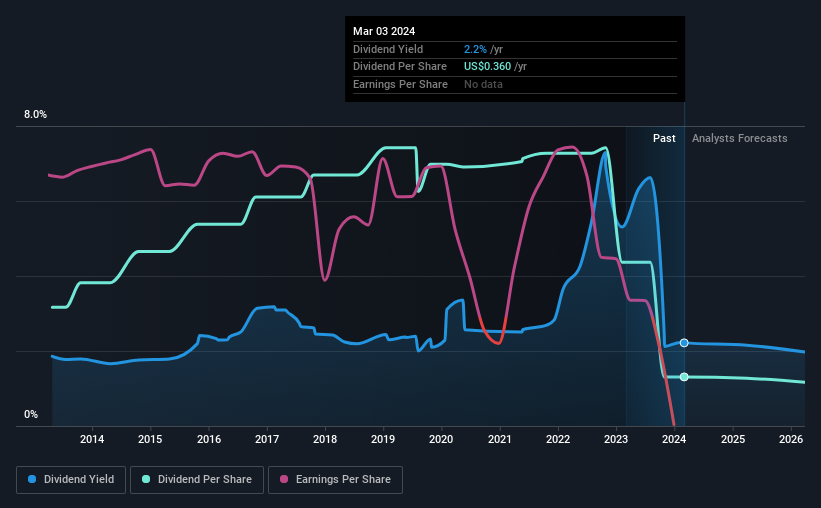Here's Why We're Wary Of Buying V.F's (NYSE:VFC) For Its Upcoming Dividend
Some investors rely on dividends for growing their wealth, and if you're one of those dividend sleuths, you might be intrigued to know that V.F. Corporation (NYSE:VFC) is about to go ex-dividend in just four days. The ex-dividend date occurs one day before the record date which is the day on which shareholders need to be on the company's books in order to receive a dividend. The ex-dividend date is of consequence because whenever a stock is bought or sold, the trade takes at least two business day to settle. Accordingly, V.F investors that purchase the stock on or after the 8th of March will not receive the dividend, which will be paid on the 20th of March.
The company's next dividend payment will be US$0.09 per share, and in the last 12 months, the company paid a total of US$0.36 per share. Looking at the last 12 months of distributions, V.F has a trailing yield of approximately 2.2% on its current stock price of US$16.24. If you buy this business for its dividend, you should have an idea of whether V.F's dividend is reliable and sustainable. We need to see whether the dividend is covered by earnings and if it's growing.
View our latest analysis for V.F
Dividends are usually paid out of company profits, so if a company pays out more than it earned then its dividend is usually at greater risk of being cut. V.F reported a loss after tax last year, which means it's paying a dividend despite being unprofitable. While this might be a one-off event, this is unlikely to be sustainable in the long term. Considering the lack of profitability, we also need to check if the company generated enough cash flow to cover the dividend payment. If cash earnings don't cover the dividend, the company would have to pay dividends out of cash in the bank, or by borrowing money, neither of which is long-term sustainable. Fortunately, it paid out only 36% of its free cash flow in the past year.
Click here to see the company's payout ratio, plus analyst estimates of its future dividends.
Have Earnings And Dividends Been Growing?
When earnings decline, dividend companies become much harder to analyse and own safely. Investors love dividends, so if earnings fall and the dividend is reduced, expect a stock to be sold off heavily at the same time. V.F was unprofitable last year and, unfortunately, the general trend suggests its earnings have been in decline over the last five years, making us wonder if the dividend is sustainable at all.
Many investors will assess a company's dividend performance by evaluating how much the dividend payments have changed over time. V.F's dividend payments per share have declined at 8.4% per year on average over the past 10 years, which is uninspiring. It's never nice to see earnings and dividends falling, but at least management has cut the dividend rather than potentially risk the company's health in an attempt to maintain it.
Get our latest analysis on V.F's balance sheet health here.
To Sum It Up
From a dividend perspective, should investors buy or avoid V.F? We're a bit uncomfortable with it paying a dividend while being loss-making. However, we note that the dividend was covered by cash flow. Overall it doesn't look like the most suitable dividend stock for a long-term buy and hold investor.
Having said that, if you're looking at this stock without much concern for the dividend, you should still be familiar of the risks involved with V.F. Every company has risks, and we've spotted 2 warning signs for V.F you should know about.
Generally, we wouldn't recommend just buying the first dividend stock you see. Here's a curated list of interesting stocks that are strong dividend payers.
Have feedback on this article? Concerned about the content? Get in touch with us directly. Alternatively, email editorial-team (at) simplywallst.com.
This article by Simply Wall St is general in nature. We provide commentary based on historical data and analyst forecasts only using an unbiased methodology and our articles are not intended to be financial advice. It does not constitute a recommendation to buy or sell any stock, and does not take account of your objectives, or your financial situation. We aim to bring you long-term focused analysis driven by fundamental data. Note that our analysis may not factor in the latest price-sensitive company announcements or qualitative material. Simply Wall St has no position in any stocks mentioned.

